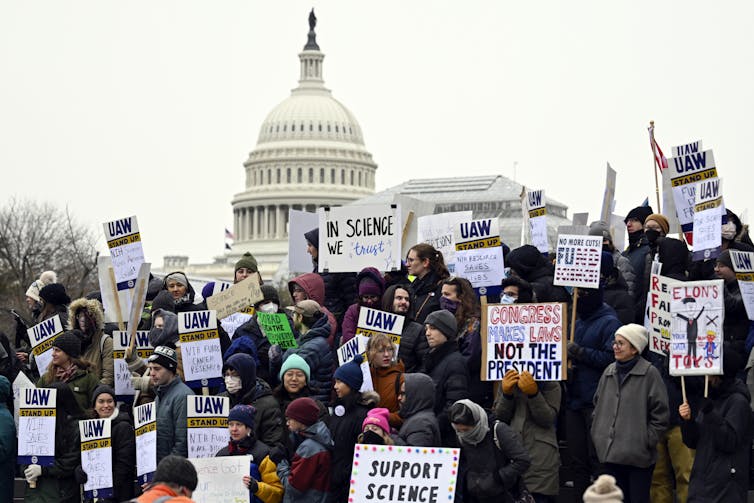Goldstone’s most recent book is "On Account of Race: The Supreme Court, White Supremacy, and the Ravaging of African American Voting Rights.
With conservatives dominating the Supreme Court, originalism — once a fringe legal theory — now dominates the highest levels of the judicial branch.
As described by former Justice Antonin Scalia, originalism is a “manner of interpreting the Constitution to begin with the text, and to give that text the meaning that it bore when it was adopted by the people.” The most prominent devotee on the current court is Clarence Thomas, described by Federalist Society Co-chairman Steven Calabresi as “the leading originalist in the country” and “the Justice who’s written the most originalist opinions of any Justice who’s served on the Court.” Thomas’ five conservative brethren are not far behind.
As was Scalia, some originalists are also textualists. In a 1996 speech at Catholic University in Washington, D.C., he noted, “I take the words as they were promulgated to the people of the United States, and what is the fairly understood meaning of those words.” Although there are minor differences in the two approaches, best suited for law school seminars, both textualism and originalism argue that the words of the Constitution have an immutable, sacrosanct meaning, not open to creative interpretation by advocates of what antagonists sneeringly refer to as a “living Constitution.”
Sign up for The Fulcrum newsletter
Originalism is not devoid of logic. There is an argument to be made that a system of laws should not change willy-nilly based only on how a particular judge or group of judges decide to interpret it on a particular day. To function effectively, a society based on the rule of law needs an accurate sense of what the law actually is.
But ignoring everything but language has its pitfalls as well. When Scalia urged his colleagues to “Go back to the good, old ‘dead Constitution,’” he seemed to overlook a couple of potential problems a language-in-cement approach might engender. One appears both in Article I, which covers the legislature, and Article II, the executive.
When describing who would be qualified to serve as a representative, a senator or a president, the Constitution specifically says “he.”
While for most, the pronoun is obviously an anachronism — we have “she” House members, “she” senators and were within a whisker of having a “she” president — the language presents a problem for originalists. Not only does the text specifically say “he,” but it was certainly the intent of the framers that men only should hold those offices. Even if it were not, as Scalia pointed out, “If you are a textualist, you don’t care about the intent.” The words, then, must stand on their own.
And so, originalists and textualists, forbidden from admitting that the Constitution does actually evolve, are forced to find some legal or grammatical basis to get past the absurdity of excluding women from national office only on the basis of a pronoun.
The first ploy is the “gender neutral pronoun” theory. Former law professor Robert Natelson, a senior fellow of constitutional jurisprudence at the Federalist Society, asserted, “We should be clear that the Constitution’s use of ‘he’ and its variants to refer to the president is of little evidentiary weight, since during the Founding Era, as in all modern history before the 1970s, those words served as standard pronouns of indefinite gender.” That sounds fine until one accepts both that “he” is not necessarily “indefinite” and that there is not a scintilla of evidence that a single “he” who drafted the Constitution would not have blanched at the thought of a woman running the country.
Natelson further posits that because some women were allowed to vote in New Jersey, the framers actually did anticipate women voting nationally. This is nonsense. He fails to mention that the women were almost exclusively widows who were only allowed to vote because of an unintended glitch in the New Jersey Constitution, and that appalled (male) legislators rectified the error when they redrew the state’s document in 1807.
The next move is to admit that women were indeed legally excluded in 1787, but subsequent legislation or jurisprudence overrode that meaning. That leads directly to the 19th Amendment. Surely, it is argued, that when women were granted the right to vote, the right to hold national office came with it. But voting is not the same thing as being qualified to hold office. Eighteen-year-olds can vote, but not be elected to Congress or become president.
The Supreme Court actually spoke on this question in 1875. In Minor v. Happersett the justices ruled unanimously that, while the 14th Amendment made all native-born women citizens — the amendment reads “persons” — and guaranteed them the same “privileges and immunities” of citizenship, the right to vote and (one must assume) the right to hold public office were not included. Therefore, while all national officeholders must be citizens, all citizens need not be eligible to be national officeholders.
In addition, as Natelson himself pointed out, “he” as a gender-neutral pronoun was as common in 1868 as in 1787, yet those who drafted the amendment chose not to use it.
And so, while originalists can try to squeeze their “neutral pronoun” and jurisprudential theories through the eye of a semantic needle, the fact remains that in this instance, neither the text, nor the accepted meaning, nor jurisprudence can prevent originalism from falling flat.
While the pronoun kerfuffle will have no practical impact on officeholding either locally or nationally, originalists understand that small words can have big consequences. If constitutional anachronisms indeed exist, how can originalists argue that, in all cases, 1787 language must rule 21st century America?
In fact, the “dead Constitution” that Scalia and his fellow originalists value so highly is an absurdity. Even Natelson admitted, “The framers of the federal Constitution sought to draft an instrument that would last for the ages.” It is difficult to see how a document whose meaning is frozen in time, that cannot adapt or be adapted to the drastic changes that time and progress inevitably engender, can be an instrument for any age except the one in which it was written.























